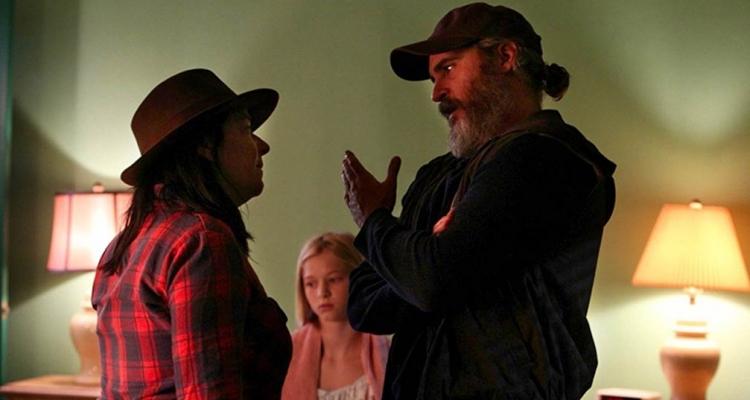Lynne Ramsay’s latest film, “You Were Never Really Here,” packs a whole can of worms in its thin 89-minute running time. In the film, Joaquin Phoenix plays a war veteran who now works as a hitman. His attempt to save a young girl from a sex trafficking ring becomes very complicated once he uncovers a political conspiracy lurking beneath it. The directing and editing (courtesy of Joe Bini) are the real selling points here, as Ramsay tries an experimental approach. Through quickly snipped flashbacks and ambiguous voiceover, the director finds ways to show as little as possible, but say as much as any big or small studio film out there. She builds up her main character in ways that feel like the story is being told through his disturbed, frenetic and PTSD-filled subconscious. Heady stuff, but masterfully done.
The 48-year-old Ramsay, with her rare, unique directing voice, is not new to risk-taking, starting with her staggering debut “Ratcatcher” to the disturbing, and profoundly devilish, “We Need To Talk About Kevin,” the filmmaker’s career has been marked by one great movie after another. She refuses to adhere to Hollywood conventions and thus her art goes places that have never been seen before on-screen. Driven by a unique and affecting inner, auteuristic voice, that is almost impossible to describe, Ramsay feels like an oasis in a sea of muck, which makes “You Were Never Really Here” a welcome addition to her oeuvre. I spoke to her about the film, the influence of graphic novels on her work, and the brilliant enigma that is Joaquin Phoenix.
First things first, you don’t know how excited I am speaking to you, I’ve been on the Lynne Ramsay bandwagon ever since “Ratcatcher,” so we have a lot of catching up to do.
[laughs] Thanks, Jordan. I don’t mind the catching up.
I saw “You Were Never Really Here” at Cannes almost a year ago, it was titled as a “work in progress” but this latest version I just saw feels much more like a completed version. What exactly changed?
Well, there were storyboards right before Cannes of the war sequences, which had the almost flashback kind of feel, you know all the crazy stuff happening in his brain, they were shot a few weeks before Cannes. I told Joaquin we need to shoot this before Cannes, and we were going to shoot it later. We were really rushing to have this thing come together and going with instincts, but after Cannes, we were able to add a lot of details and really explore more of Johnny’s [Greenwood] music. The Cannes thing was quite a surprise, it wasn’t something that I presented as an option myself, so I went “Oh my gosh,” and also we just sent the film without credits [laughs] but I don’t think it was a work in progress, it just feels more polished today.
I remember the “work-in-progress” and noticing that there were absolutely no credits [laughs].
I mean, we really decided to send it to the festival when Cannes said, “We really really want it.” The war sequences, the scenes with the mother and Johnny’s underwater sequence were all meant to be shot after Cannes. We thought we were going to be going to Venice, so it was very crazy, frenetic to have it ready, but, in the end, we felt really good about it and Joe Bini is a really fantastic editor. I had never really shot on digital before, but it was just one of those things where you don’t really want to edit anything off but the versions are still getting shorter. So that’s how it happened, briefly.
This newer version feels tighter, more concise, despite some of the flashbacks having been cut off, but they do strike me as two slightly different movies
Well, I guess the Cannes version was kind of an assembly of the material that we wanted, so it was kind of like saying, “Here’s the story that we want to tell but we will probably chop some pieces off.” The flashbacks were supposed to represent what post-traumatic stress feels like, the newer version is more emotional and violent, in a way, it comes back to more banal moments which, to me, felt truer. There were things about the Cannes cut too. The catch-22 about Cannes was that sure it was a work-in-progress, but I have my producer saying “everyone loves the Cannes version don’t change it.” At Cannes you could use any music you want, copyrights aren’t an issue, so it was painful, hurtful to know that some of the music we used at Cannes could not be used in the theatrical version. But I got over it, some movies are already set to be whatever they are going to be and this movie was already set to be this crazy thing, whether we used the original music or not.

